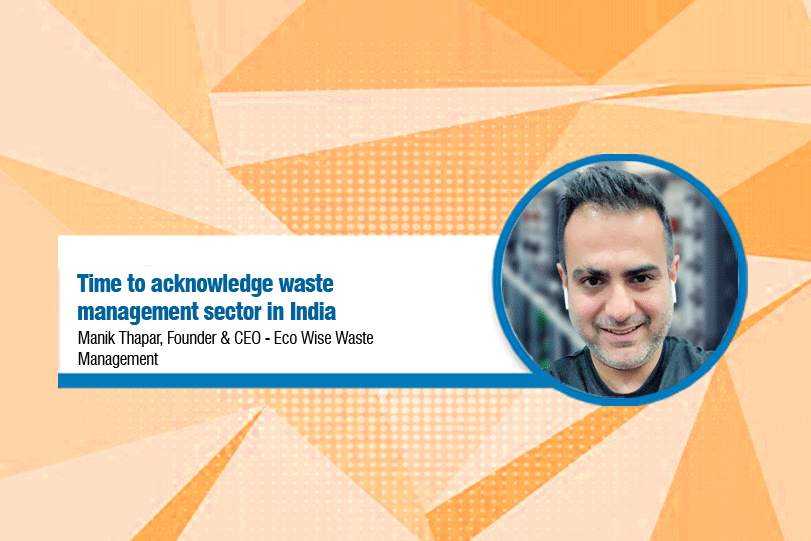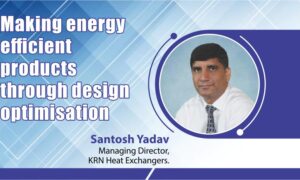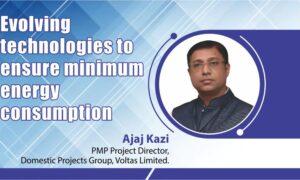Most of the cities are tendering out their waste management to a single company, which is affecting the businesses, and creating a monopolistic and cartelisation of the waste industry.
Manik Thapar, Founder & CEO – Eco Wise Waste Management
Solid Waste Management is a major environmental issue in India. Due to amplifying urbanisation, industrialisation and population, the generation rate of municipal solid waste in Indian cities and towns has also increased. With rapid urbanisation, the country is facing massive waste management challenge. In discussion with Athira Bejoy of TCBU, Manik Thapar – Founder & CEO – Eco Wise Waste Management shares the main pain points that the waste management industry is facing and what is to be done about it.
Generating energy from industrial waste
It always depends on the kind of waste that the industry is generating. Most recyclable waste like plastic, cardboard etc. are being managed and recycled. So, what you are left with is the organic waste. In India, the prolific value of organic waste is pretty low. So, the energy generation from industrial waste is pretty low, in my opinion.
Latest trends in recycling the recyclables
In case of recyclables, for paper, there are already paper mills who are recycling all the paper wastes. However, in terms of plastics, the country should bring in a lot of infrastructure and investments to bring in new and latest technologies to recycle plastic. Hardly, any of the plastic is getting recycled now; most of them are getting downcycled.
There are processes that are in place and are majorly used globally. Most of the process used to recycle plastic in India are mechanical. The global processes are based on chemical recycling which works within the preview of the circular economy. For example, plastic bottles are down cycled into fibre, then into yarn and then t-shirt. However, when the t-shirt reaches the end-of-life, presently, there are no ways to recycle it. Most of them end up in a landfill.
A true recycling means product-to-product recycling. So, rPET which is recycled PET should be used in manufacturing of new food grain products. For this to happen, a lot of things need to be done such as change in policies; as the current policies doesn’t allow that to happen, also building segregation, treatment infrastructure, and bringing in new technologies so that it can be done in a sustained and proper manner. recognition
Government support
The foremost thing that the government needs to do is to give us (people involved in the waste management industry) an industry status. Though there are talks about Swachh Bharat going on, the truth is that this sector is not given its due status. This is the most important thing to be done. Secondly, from the waste management perspective is that lot of competition should be bought in for the industry. There should be an open market concept where entrepreneurs are encouraged to enter this sector which is not happening right now because most of the cities are tendering out their waste management to a single company. This is affecting the businesses and creating a monopolistic and cartelisation of the waste industry.
The key challenges
The unorganised sector and the SMEs involved in the industry are just getting pushed out when we require 100s-1000s of them to be a part of this sector in order to achieve the prime results of ‘Swach Bharat’ that the Honb’l Prime Minister wants to achieve.
There are quite a number of policies that have been put into place but are yet to be implemented; EPR (extended producer responsibility), being one of them. It should be ensured that companies are implementing it on the ground level and not just on paper. As of now, all the works are being done on paper but are rarely implemented. We need to start implementing it on the grass root level. The other main challenge is the traceability of the work being done. There should be a traceability about what is being claimed by companies and what is actually happening.
The fourth is the data; 95 per cent this sector works under an unorganised structure. Also, when it comes to treatment being implemented, there exists a massive gap between what is being told and what is happening in terms of data; no data availability and traceability happening. So, data validation and data availability is the need of the hour which can then drive policies, guide municipalities on what they need to do in terms of corrective measures.
Also, MLP, which is multi-layered plastic, is a big problem; it is a single use plastic which most of the FMCG industry use is kind of a major issue. As of now, the government has mandated that the cement kilns to use them in co-processing so that it doesn’t end up in the landfill. This is going to be implemented as of now because it is still in its nascent stage.
Waste to oil
Plastic is mainly a ‘derivative’ of petroleum product. There are technologies, globally, that makes oil out of plastics. However, you require a specific quality of plastic. India’s main challenge is that you don’t get that required ‘quality’ because you have a commercial value out in the market, in terms of it being recycled or down cycled. A lot these plastic is sold in the market to scrap dealers, who then send it to processing facilities.
Most of the waste that has the potential to generate energy or something that has prolific value in it, are removed from the waste and sold it to scrap dealers as that has more recycle commercial alue in the market. So, now people are coming with waste –to-oil or specially to do with plastic, i.e. plastic waste to oil which is being tested out and is not completely viable alternative as of now. It is still being tested to see if something can happen out of it.
Cookie Consent
We use cookies to personalize your experience. By continuing to visit this website you agree to our Terms & Conditions, Privacy Policy and Cookie Policy.















